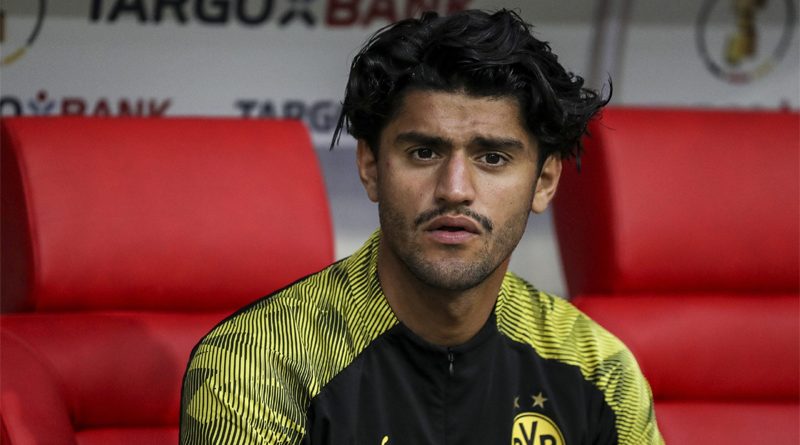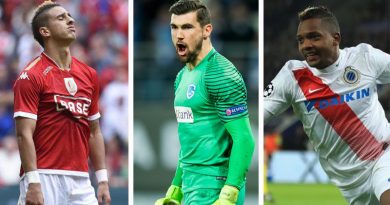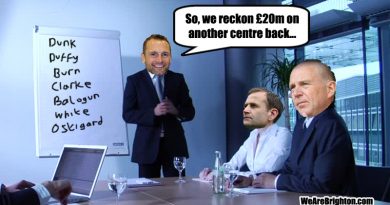Mahmoud Dahoud: The new playmaker in the Brighton midfield
The first thing to note about new Brighton midfielder Mahmoud Dahoud is that he has an incredible rhyming name.
When Fabrizio Romano first revealed the Albion were going to sign the German international from Borussia Dortmund back in early May, we asked on Twitter if Brighton had ever had a player whose named rhymed before?
Some Albion fans consulted ChatGPT. Artificial intelligence took five minutes out of planning how to conquer mankind and could not find anything.
Suggestions from actual human brains stretched as far as Andy Ritchie, Jamie Moralee, Julio Enciso and Andy Crosby. Given they are all questionable answers at best, we can safely conclude that Mahmoud Dahoud does indeed become the first ever Brighton player with a rhyming name.
There is much more to him than that, however. The 27-year-old arrives a proven midfield playmaker in the Bundesliga, ready to come straight into the Albion’s starting XI.
He represents a different kind of signing to the Seagulls’ usual type of young, raw talents who require time and patience before making an impact.
And Brighton have acquired him without needing to spend a penny in transfer fees of the £35 million they received from Liverpool for Alexis Mac Allister, who Dahoud appears to be replacing.
Born in Syria, Dahoud came through the youth system at Borussia Monchengladbach. He first made a name for himself with 14 appearances in the Monchengladbach reserve side who won the Regionalliga West title in 2014-15.
That form was good enough to see Dahoud promoted into the first team squad for the 2015-16 Bundesliga season. A breakout campaign saw him play 41 times in all competitions, scoring five times and contributing nine assists.
Monchengladbach finished fourth, picking up some impressive results along the way. Amongst those was a 5-1 win away against Eintracht Frankfurt, a game in which Dahoud ran the show. He scored, assisted and received a standing ovation from the Eintracht fans when he was substituted.
Already a fan favourite at Borussia-Park, Dahoud endeared himself to the Monchengladbach faithful even more with the winner in the Rhine Derby against Koln on Valentine’s Day.
Dahoud added another seven assists and three more goals to his Monchengladbach career numbers in 2016-17. His popularity began to dip towards the end of the campaign after it was announced he would not sign an extension to his contract, which was set to run out in 2018.
Paris Saint-Germain and Liverpool were amongst the clubs put on red alert by the possibility of picking up Dahoud for a knockdown fee in the summer of 2017. It was Dortmund, however, who secured his signing for just over £10 million.
Established as one of the best midfielders in the Bundesliga when he arrived at Signal Iduna Park and hailed as an absolute coup for Dortmund, Dahoud never really lived up the hype due to a combination of factors.
The biggest strength of his game is his passing range and ability to work the ball out of tight, risky situations. That makes it easy to see why Roberto De Zerbi is such a fan; Mahmoud Dahoud looks perfectly suited to Brighton and DeZerbiBall.
At Dortmund though, Dahoud lacked the engine and physicality to play the blood-and-thunder style of football Die Schwarzgelben are famous for.
Of the five years he spent with Dortmund, only a 18 months period between the autumn of 2020 and the spring of 2022 could be considered a sucess.
Dortmund initially tried Dahoud as a defensive midfielder, but at 21-years-old and having never played in the holding role before, he lacked the maturity and discipline for it.
Manager Lucien Favre next used Dahoud as a number 10, bringing him on late in games to replace Marco Reus. Again though, it was a role Dahoud was ill-suited too.
There was little opportunity playing so high up the pitch for him to use his ability to hit short and long passes through gaps nobody else could spot to the full.
Dahoud was lost in the shuffle, spending time behind all of Reus, Emre Can, Axel Witsel, Thomas Delaney and Julian Wiegl in the pecking order.
A succession of injury problems did not help and Dahoud played just 26 times in the Bundesliga over the 2018-19 and 2019-20 seasons combined.
One German media outlet said of Dahoud: “He has even grown a terrible moustache to stand out, and that isn’t working either.” The campaign starts here for Mahoud Dahoud to bring back his terrible moustache now he is a Brighton player.
Favre’s sacking in December 2020 led to Dahoud’s most impactful spell at Dortmund. New boss Edin Terzic was more inclined to give Dahoud an opportunity as a central midfielder with playmaking responsibilities, the same role he had thrived in at Monchengladbach.
Dahoud’s lack of engine was no longer a problem as alongside him, he had a certain Jude Bellingham. Although only 17-years-old, Bellingham was already establishing himself as a Dortmund regular and his boundless energy and box-to-box ability meant he could do the midfield running for both himself and Dahoud.
In return, Dahoud had by now developed the defensive discipline and positional understanding required to sit in front of the defence.
His knack for always choosing the right pass and never losing possession helped Bellingham shine in an attacking sense, as much as Bellingham’s unique talents worked in tandem with Dahoud.
The 2020-21 season ended with Dahoud having made 31 appearances for Dortmund, including starting in the DFB Pokal final. Dahoud assisted the first goal for Jadon Sancho as Dortmund beat RB Leipzig 4-1, giving Dahoud the first major honour of his career.
His debut for Germany came in that same successful 2020-21 campaign. He currently has two caps for Die Mannschaft, although it seems unlikely he will any more whilst with Brighton.
If Pascal Gross cannot get into Hansi Flick’s squad despite Germany’s current struggles, then one can conclude Herr Flick is not aware of the existence of the Albion.
Dahoud played 30 times for Dortmund in 2021-22, being described by Bundesliga Daily as “the team’s prime orchestrator in possession.”
The same article was gushing in its praise for Dahoud’s new-found defensive abilities too, saying: “Dahoud has been not only key for the Black & Yellows in dictating possession and switching play left to right, he’s also been key in screening opposition strikers and stopping passes being made into their paths.”
“The German midfielder isn’t exactly a tough-tackling Can or Delaney, but he has solid defensive awareness and is far less likely to pick up yellow cards or concede fouls.”
Unfortunately for Dahoud, further injuries saw him fall from favour and with Dortmund challenging for the Bundesliga title in 2022-23, he was unable to re-establish himself in their starting XI.
Dahoud made just four starts amongst a total of only 10 appearances before his release and subsequent arrival at the Amex on a free transfer.
He leaves Germany having played 141 times for Dortmund and 86 for Monchengladbach. From that total of 227 matches, Dahoud has 13 goals and 33 assists.
The challenge Brighton now face is helping Dahoud overcome the frequent injury problems that stopped him being a success at Dortmund.
If they can do that and he rediscovers his form of 2021, then Dahoud looks ready-made to fill one of the defensive midfield sports vacated by Mac Allister and potentially Moises Caicedo before the transfer window slams shut.
Dahoud is a different player to either of those. He will not cover as much ground, instead letting the ball do the work through his exquisite passing ability.
The prospect of him threading balls left and right to Kaoru Mitoma and Solly March after the Albion have drawn the press and look to break at speed is an exciting one.
Almost as exciting as his name rhyming. And that moustache. Which we have to mention one last time, courtesy of WtFoot.com: “Word is Dahoud has got no tattoos whatsoever, just like his mate Mario Gotze. He expresses through his moustache, though. It’s like modern art to us. Incomprehensible.”




